Africa’s rail network has dramatically contracted over the past two decades. The railway sector in Africa is suffering from declining government commitment and private sector reluctance to invest. African countries must address the challenges of growing urbanization by investing more in railways. Railway investments need to be coordinated across African countries and with other infrastructure investments. Inadequate railway infrastructure makes it difficult to create continental value chains and trade corridors.
Africa’s rail network has dramatically contracted over the past two decades
One of the main reasons is that the rail network in Africa has dramatically contracted over the past two decades. Whereas many countries had once invested heavily in rail infrastructure, by 2010 only 16 African states had a national railway system that was connected to other countries. In contrast, most European and Asian countries have international links and integrated networks. The scale of this contraction is evident when it is compared with Europe’s vast network: if Africa’s railways were to exist as a standalone entity without connection to anywhere else on Earth, then they would be less than 1% of the size of Europe’s equivalent network!
The railways sector in Africa is suffering from declining government commitment and private sector reluctance to invest.
This is not an isolated phenomenon. Many African countries are experiencing a decline in their railway systems. This has been caused by factors such as poor management and underinvestment, which have resulted in operational challenges, poor service quality and financial losses.
Railways are expensive to build and operate: they require large capital expenditure upfront at the construction stage; maintenance costs are high due to the ageing infrastructure; labour costs remain high because of low productivity; operations are inefficient due to poor management systems; train operating companies (TOCs) fail when they fail to generate adequate revenue (because they are often loss making); there is little incentive for them to improve their performance because they do not own assets such as trains or tracks that could be sold off if they went bankrupt – instead these assets remain owned by governments who continue subsidising them through direct grants or loans at below market rate interest rates
The once dominant rail transport networks in Africa keep experiencing challenges
While Africa’s road transportation networks are growing, there are challenges with rail transport. Many of the railway infrastructure is old and need to be updated. In addition, the railway network is not as extensive as it used to be because of state-owned monopolies and a lack of investment over the years. This has resulted in fewer trains running on time and fewer passengers using this mode of transportation because they find it unreliable and inefficient compared to other options such as buses or airplanes, which can take you from one country to another with ease.
Despite these, Africa’s few trains will keep making an impact in terms of transportation since rail transport is still an efficient means of transporting goods and people. In Nigeria, for example, the Kaduna-Abuja line has been redeveloped to enable higher speeds. It now transports over 1 million metric tons of cargo per month—more than double what was achieved before 2015. Despite being done at a slow pace, Africa’s rail network will continue to be upgraded to accommodate more freight and passengers.
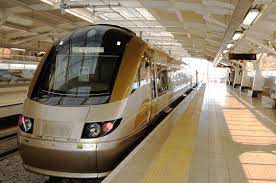
High Speed commuter train in the Gauteng Province of South Africa (Photo from Wikipedia)
African countries must address the challenges of growing urbanization by investing more in railways.
African countries face a number of challenges as they seek to grow their economies and urbanize their populations. Growing urbanization comes with its own set of challenges, including increased traffic congestion and pollution, which are major factors that negatively affect quality of life. Railways can help alleviate this burden by providing an efficient alternative mode of transport for citizens and businesses alike.
Railways can also create jobs, allowing young people to find employment in industries related to rail construction or maintenance. This is particularly important because many African countries have high unemployment rates among youth–an issue that will only be exacerbated as more people move into cities over time. In addition to creating jobs for young workers entering the job market for the first time, railways will also provide opportunities for those who already have skills sets in relevant fields such as engineering or manufacturing; these individuals could then apply them toward improving existing rail systems or building new ones from scratch (or both).
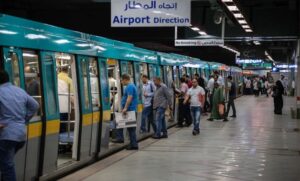
Cairo’s Attaba Metro Station, Cairo-Egypt (By Karim Abdel Aziz/Egypt Today)
Beyond creating jobs directly related to railway construction itself, there are other ways it could help reduce poverty levels across Africa: if a country has an efficient rail network connecting major cities within its borders–including rural areas–then goods produced in these areas would become more accessible on both local and international markets where they could fetch higher prices due to reduced transportation costs compared with sea freighting alone; this would lead some farmers/ranchers who currently sell only locally (and therefore receive low prices).
Railway investments need to be coordinated across African countries and with other infrastructure investments.
Coordinating rail investments with other infrastructure investments is important to ensure the success of rail. Other infrastructure investments include roads, ports, and airports. For example, a port would be strategically located to serve as a hub for containerized freight coming from China and elsewhere in Asia for cargo distribution throughout Africa. This would complement the rail system by making it easier to move cargo from one region of Africa to another via rail or trucking; however, if there were no good road infrastructure between these ports/hubs then shippers may not use them because they can’t economically move their goods at competitive rates due to high costs (e.g., fuel) or logistical challenges (e.g., congestion).

Raml Tramway is the oldest tram in Africa (From Urban Transport Magazine).
Inadequate railway infrastructure makes it difficult to create continental value chains and trade corridors.
Railways are critical to creating continental value chains and trade corridors. Railroads provide a means for goods to be transported from one location to another, as well as allowing for the transfer of information and knowledge across different countries. This means that railroads can help create regional integration, which in turn accelerates inclusive economic growth through increased efficiency and lower costs.
In addition, railways are key for ensuring that Africa’s valuable resources reach their maximum value before leaving the continent. As such, it is vital for African governments to invest in railway infrastructure projects so that they can develop their economies further by connecting various industries with each other through trade opportunities.
Africa’s underinvestment in rail infrastructure stands in the way of economic development, regional integration, and inclusive growth
Africa’s underinvestment in rail infrastructure stands in the way of economic development, regional integration, and inclusive growth. Railway infrastructure is crucial for economic development as it facilitates trade and investment and helps alleviate poverty by connecting people to key markets. It also aids with regional integration by facilitating the movement of both goods and people across borders. As such, improving railway networks can increase productivity in Africa as it creates new opportunities for business opportunities by facilitating cross-border trade between countries.
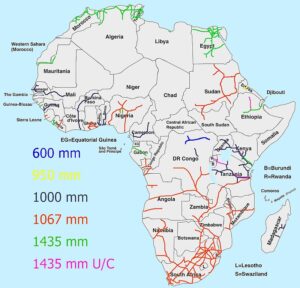
Map of Rail Transport in Africa (From Wikipedia)
Conclusion
It is clear that there is a need for investment in railways in Africa. Urbanization and the growth of cities will continue to drive demand for better infrastructure, including rail. As trade corridors and value chains are increasingly international, more efficient transportation networks will become essential for countries seeking to maximize cooperation with other regions and countries.
Images Sources: Wikipedia and Urban Transport Magazine
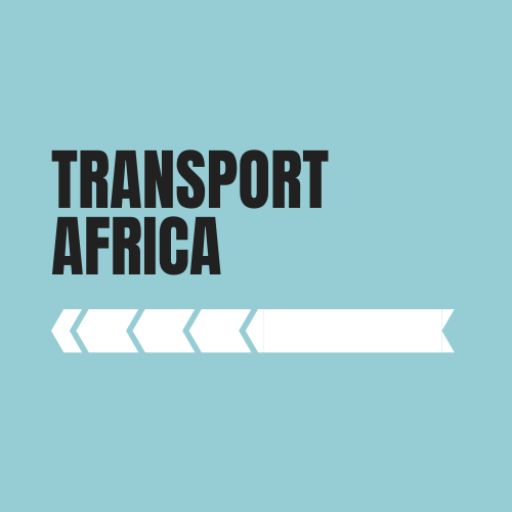
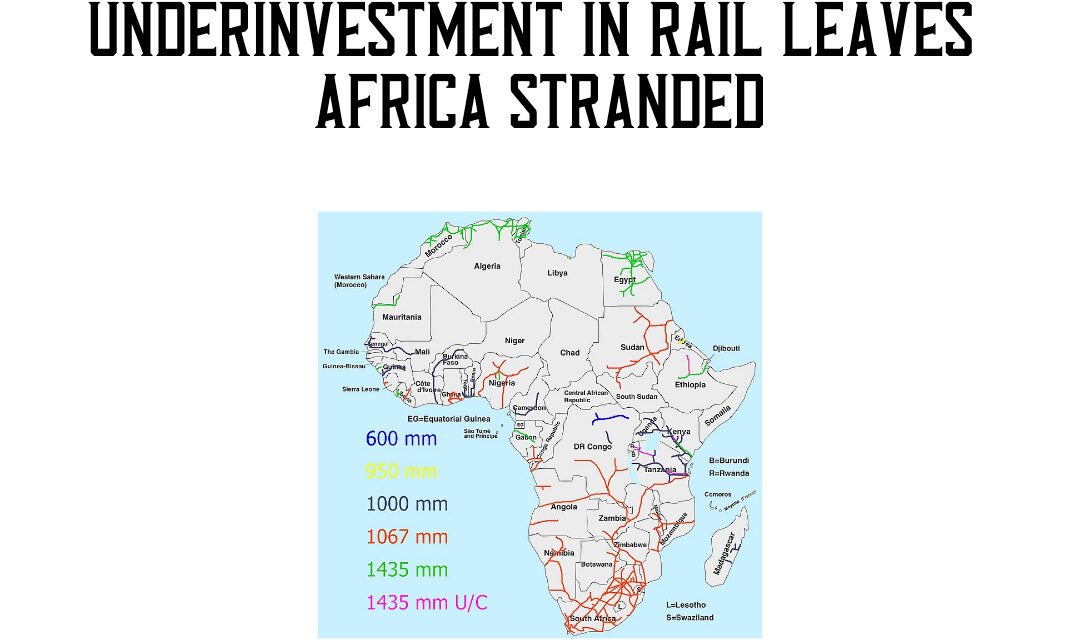

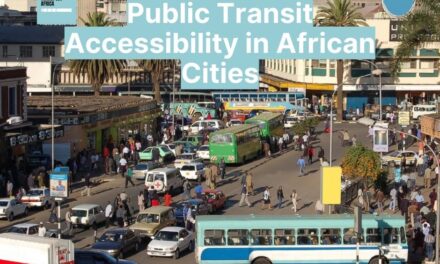


Thanks for another fantastic article. Where else may anyone get that type of information in such a perfect manner of…